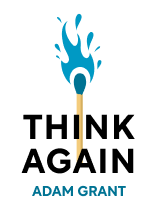

This article is an excerpt from the Shortform book guide to "Think Again" by Adam Grant. Shortform has the world's best summaries and analyses of books you should be reading.
Like this article? Sign up for a free trial here.
Is it bad to be overly confident? Why is it important to temper your confidence?
Having too much confidence in your beliefs and abilities makes you too assured that all your views are correct, making you closed off to alternative perspectives. According to Adam Grant, the antidote to overconfidence is a healthy dose of doubt. When your doubt and confidence are balanced, you have faith in your abilities and can acknowledge that you may have more to learn.
There are several ways to balance your level of doubt and confidence.
Be Honest About Your Abilities
The first way to overcome having too much confidence is to have a realistic understanding of your capabilities. When you consider yourself capable of handling a task or mastering a concept, you run the risk of becoming too self-assured and too focused on what you already know. As a result, you don’t think about your weaknesses or knowledge gaps, which will make it difficult for you to improve your skills or integrate new information.
(Shortform note: One challenge to being honest about your abilities is that it’s easy to overlook certain areas. You can combat these blind spots by creating an exhaustive list of your strengths and weaknesses and then organizing these qualities into categories such as “interpersonal,” “intellectual,” and “emotional.” This allows you to acknowledge and analyze your attributes without becoming overwhelmed by a disorganized list.)
Acknowledge Your Limitations
Acknowledge your limitations positively—without putting yourself down. Instead, Grant encourages you to make an effort to view your weaknesses as opportunities to learn, grow, and improve yourself.
| Introduce Positive Self-Talk Into Your Inner Dialogue The ability to overcome negative self-talk tendencies is crucial to staying positive about your limitations—if your instinct is to beat yourself up over weaknesses or mistakes, it’s nearly impossible to see them in a positive light. Psychologists recommend overcoming this tendency by consciously introducing more positive self-talk into your inner dialogue. For example, while working on a project, praise yourself for everything you do right instead of focusing on what’s going wrong. Going a step further, if you can identify points in your day when you know you’ll be highly conscious of your limitations, create a plan to help guide yourself through these moments of doubt—what response can help you to manage your anxiety and combat your tendency to be self-critical? For example, when you know you will be in a stressful meeting, remind yourself ahead of time to avoid negative self-talk (“I should have known that!”) and instead engage in positive self-talk that reframes the moment of doubt as an opportunity (“I’m going to learn something new today!”). |
Discover Your Knowledge Gaps
Put together all the information you have about a subject and try to explain it to another person—if they have trouble understanding you or seeing the logical connections in your arguments, that’s a strong indication that you may need to do more research into the topic.
(Shortform note: Grant suggests that you put together a full summary of what you know about a topic to fully assess your knowledge base. However, researchers have found that it’s not actually necessary to go through this entire exercise to discover your lack of knowledge. Typically, when people reflect on what they are able to explain about a subject, they immediately back down from an overconfident position.)

———End of Preview———
Like what you just read? Read the rest of the world's best book summary and analysis of Adam Grant's "Think Again" at Shortform.
Here's what you'll find in our full Think Again summary:
- Why the ability to reconsider is more important than precise knowledge
- How knowledge and expertise can narrow your thinking and limit your potential
- How to improve your ability to reconsider things in work and in life






